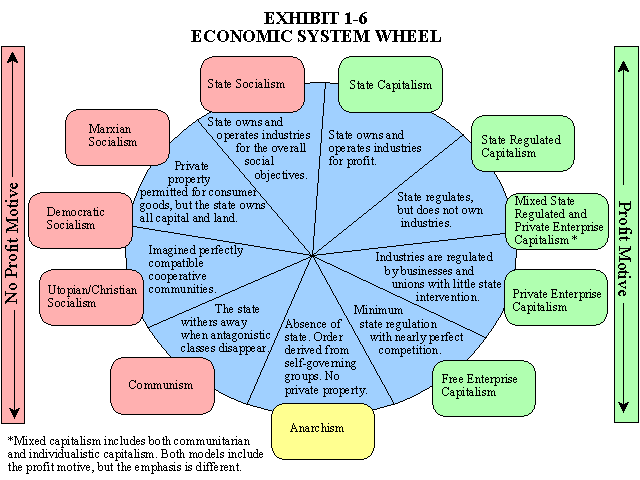
Marxist-Leninist Communist states (red) and formerly Communist-run (orange) countries of the world.
There are several basic questions that must be answered in order for an economy to run satisfactorily. The scarcity problem, for example, requires answers to basic questions, such as: what to produce, how to produce it, and who gets what is produced. An economic system is a way of answering these basic questions, and different economic systems answer them differently. Many different objectives may be seen as desirable for an economy, like efficiency, growth, liberty, and equality.
Economic systems can be divided by the way they allocate economic inputs (the means of production) and how they make decisions regarding the use of inputs. A common distinction of great importance is that between capitalism (a market economy) and socialism (economic planning).
In a capitalist economic system, production is carried out to maximize private profit, decisions regarding investment and the use of the means of production are determined by competing business owners in the marketplace; production takes place within the process of capital accumulation. The means of production are owned primarily by private enterprises and decisions regarding production and investment determined by private owners in capital markets. Capitalist systems range from laissez-faire, with minimal government regulation and state enterprise, to regulated and social market systems, with the stated aim of ensuring social justice and a more equitable distribution of wealth (see welfare state) or ameliorating market failures (see economic intervention).
In a socialist economic system, production is carried out to directly satisfy economic demand by producing goods and services for use; decisions regarding the use of the means of production are adjusted to satisfy economic demand, investment (control over the surplus value) is carried out through a mechanism of inclusive collective decision-making. The means of production are either publicly owned, or are owned by the workers cooperatively. A socialist economic system that is based on the process of capital accumulation, but seeks to control or direct that process through state ownership or cooperative control to ensure stability, equality or expand decision-making power, are market socialist systems.
The basic and general economic systems are:
Market economy ("hands off" systems, such as Laissez-faire capitalism)
Mixed economy (a hybrid that blends some aspects of both market and planned economies)
Planned economy ("hands on" systems, such as state socialism or state capitalism)
Traditional economy (a generic term for older economic systems)
Command (Centrally Planned) Economic Systems: (a generic term for older economic systems)
Participatory economics (a system where the production and distribution of goods is guided by public participation)

Gift economy (where an exchange is made without any explicit agreement for immediate or future rewards)
Barter economy (where goods and services are directly exchanged for other goods or services)

I want to share a testimony on how Mr Pedro loan offer helped my life,
ReplyDeleteIt isn't a good idea to use a payday loan on a regular basis. In the event that you endlessly prolong your repayment date and borrow often towards your subsequent paycheck, it could run you a good amount of money. However, it is just as sensible to decide on payday loans as they can be swiftly approved exactly the same day you put in your loan application form. You can contact Mr Pedro loan offer because my payday loan was very fast to proceed, email pedroloanss@gmail.com to request any kind of loan. Whatsapp +18632310632